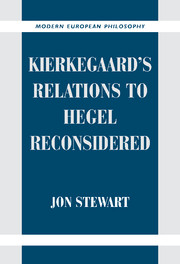Book contents
- Frontmatter
- Contents
- Acknowledgements
- Abbreviations of Primary Texts
- Preface
- Introduction
- 1 Kierkegaard and Danish Hegelianism
- 2 Traces of Hegel in From the Papers of One Still Living and the Early Works
- 3 The Ironic Thesis and Hegel's Presence in The Concept of Irony
- 4 Hegel's Aufhebung and Kierkegaard's Either/Or
- 5 Kierkegaard's Polemic with Martensen in Johannes Climacus, or De omnibus dubitandum est
- 6 Kierkegaard's Repetition and Hegel's Dialectical Mediation
- 7 Hegel's View of Moral Conscience and Kierkegaard's Interpretation of Abraham
- 8 Martensen's Doctrine of Immanence and Kierkegaard's Transcendence in the Philosophical Fragments
- 9 The Dispute with Adler in The Concept of Anxiety
- 10 The Polemic with Heiberg in Prefaces
- 11 Subjective and Objective Thinking: Hegel in the Concluding Unscientific Postscript
- 12 Adler's Confusions and the Results of Hegel's Philosophy
- 13 Kierkegaard's Phenomenology of Despair in The Sickness unto Death
- 14 Kierkegaard and the Development of Nineteenth-Century Continental Philosophy: Conclusions, Reflections, and Reevaluations
- Foreign Language Summaries
- Bibliographies
- Subject Index
- Index of Persons
5 - Kierkegaard's Polemic with Martensen in Johannes Climacus, or De omnibus dubitandum est
Published online by Cambridge University Press: 13 March 2010
- Frontmatter
- Contents
- Acknowledgements
- Abbreviations of Primary Texts
- Preface
- Introduction
- 1 Kierkegaard and Danish Hegelianism
- 2 Traces of Hegel in From the Papers of One Still Living and the Early Works
- 3 The Ironic Thesis and Hegel's Presence in The Concept of Irony
- 4 Hegel's Aufhebung and Kierkegaard's Either/Or
- 5 Kierkegaard's Polemic with Martensen in Johannes Climacus, or De omnibus dubitandum est
- 6 Kierkegaard's Repetition and Hegel's Dialectical Mediation
- 7 Hegel's View of Moral Conscience and Kierkegaard's Interpretation of Abraham
- 8 Martensen's Doctrine of Immanence and Kierkegaard's Transcendence in the Philosophical Fragments
- 9 The Dispute with Adler in The Concept of Anxiety
- 10 The Polemic with Heiberg in Prefaces
- 11 Subjective and Objective Thinking: Hegel in the Concluding Unscientific Postscript
- 12 Adler's Confusions and the Results of Hegel's Philosophy
- 13 Kierkegaard's Phenomenology of Despair in The Sickness unto Death
- 14 Kierkegaard and the Development of Nineteenth-Century Continental Philosophy: Conclusions, Reflections, and Reevaluations
- Foreign Language Summaries
- Bibliographies
- Subject Index
- Index of Persons
Summary
The name “Johannes Climacus” is well known as the pseudonymous author of the Philosophical Fragments and the Concluding Unscientific Postscript. What is less well known is that Kierkegaard planned a work entitled, Johannes Climacus, or De omnibus dubitandum est, in which he intended to treat a number of philosophical themes in a literary fashion. About fifty pages of the manuscript were written apparently between the last few months of 1842 and the first few of 1843 and were first published in Barfod's edition of Kierkegaard's journals. In this text Kierkegaard takes up a number of issues surrounding Hegel's philosophy that were being discussed in Denmark at the time (e.g., the problem of the beginning of philosophy and the problem of systematic doubt). In tone and content, much of the work is satirical of Hegelianism in a way reminiscent of The Battle between the Old and the New Soap-Cellars.
The work takes the form of an intellectual biography of a naive young student named Johannes Climacus. It recounts how he became fascinated by the most recent philosophical movements and above all by the claim that modern philosophy begins with doubt. The Introduction tells, among other things, of Climacus' childhood and how his relation to his dialectical father prepared the way for his future philosophical contemplation. Part One relates how he begins his studies and comes into contact with discussions about “the recent philosophers.”
- Type
- Chapter
- Information
- Kierkegaard's Relations to Hegel Reconsidered , pp. 238 - 281Publisher: Cambridge University PressPrint publication year: 2003

